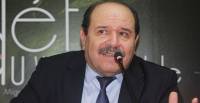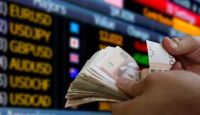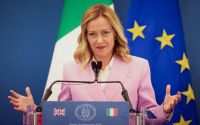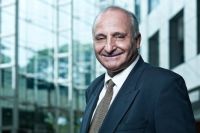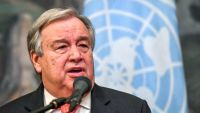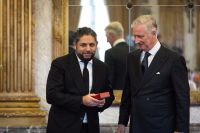This edition of the International Book and Publishing Fair (SIEL) is being held in a unique and unprecedented context. It will be the first event of international scope hosted by our country after a two-year suspension due to the repercussions of the Covid-19 pandemic, with a large influx of Moroccan and foreign visitors. This is a fine way to celebrate the Kingdom's inspiring success, under the wise leadership of His Majesty King Mohammed VI, in overcoming the most perilous undertakings to breathe new life into Moroccan cultural and intellectual life, this time from Rabat, the city of light, the capital of culture in the Islamic world and the cultural capital of Africa, which qualifies it, exceptionally, to host the continent's biggest cultural event this year.
The Council of the Moroccan Community Abroad (CCME) has chosen to focus its participation in the current edition of the SIEL on the theme "Africa in the eyes of its communities", with the aim of placing the issue of African migration at the centre of the societal debate and the cultural and intellectual current affairs of this global event, which this year has chosen Africa as its guest of honour.
Africa is one of the priority themes for the CCME, which had decided, due to the anchoring of the African tributary in the Moroccan identity, to dedicate its participation in the 2014 SIEL to Africa, being a continent at the source of human mobility. In addition to the achievements of the different works undertaken in this sense, the council intends to deepen the debate on the contemporary challenges of African migration, particularly in Europe, in the context of the profound political and cultural changes that are taking place in its societies, where the migration issue, in this case African, is becoming a major issue, the pivot of political conflicts and electoral programmes.
The debates on immigration in Europe in recent years reflect the dominance of nationalism due to the rise of extreme right-wing waves and the revival of conservative ideological theories that reject pluralism and advocate introversion as a way of life, making people believe that immigrants are a threat to the existence and culture of European societies based on misleading arguments and erroneous data that have been disproved by all the official statistics of international institutions.
Migration is an ancient phenomenon, but its treatment is currently being unjustifiably amplified. If we stick to the real facts, migrants constitute only 3.5% of the world's population, so 96% of them live in the countries where they were born. Moreover, African migrants represent only 14% of the world's migrants, a much smaller proportion than European (24%) and Asian (41%) migration, bearing in mind that more than 60% of migration in the continent is intra-African. Thus, adopting an objective and scientific approach to the treatment of African migration, whether in elections or in media debates, is one of the greatest challenges to be overcome.
On the other hand, an accurate understanding of the migration phenomenon requires a deeper understanding of several related changes. The structure of migration has undergone a radical transformation in terms of composition, since it is no longer undertaken solely by a labour force of workers with a view to returning to their countries of origin, but has become a rooted migration that has produced intellectual and scientific elites who have risen to high ranks in their fields of competence. This intelligentsia then expresses expectations that go beyond the thresholds of the first generations, their social interaction is no longer limited to migrant or worker services in the host countries but extends to state institutions as they enjoy full citizenship and hold two or more nationalities. More than that, these elites have become capable of developing visions and theories that question the intellectual and philosophical structures of the state and society.
Thus, addressing the issue of African immigration cannot be done in isolation from the issue of our time, that of the international race to attract highly qualified talent in such advanced fields as health, engineering, agriculture and modern technology. This is one of the modern and complex issues that are widening the gap between developed and developing countries, which are threatened with losing their skills due to the temptations and opportunities.
Therefore, addressing the issue of African immigration cannot be done in isolation from the issue of our time, that of the international race to attract highly skilled talent in cutting-edge fields such as health, engineering, agriculture and modern technologies. This is one of the modern and complex issues that are widening the gap between developed and developing countries, which are threatened with losing their skills due to the temptations and opportunities for professional and financial advancement offered by the countries of the North.
Finally, the Covid-19 pandemic has also had a profound impact on the world of migration. For the first time in contemporary history, the movement of people is confronted with closure measures in all continents, as almost every country in the world has imposed a general quarantine. Immigrants in Europe have lived through a most difficult period as they represent one of the vulnerable fragile groups, but these extremely difficult conditions have above all been an opportunity for them to assert their added value and to affirm that all the components of a plural society contribute, each thanks to their uniqueness, to the destiny of humanity. Immigrant communities working in vital sectors have found themselves in the forefront of providing basic services to the community of residence, and supporting materially and morally their family members in the countries of origin, through financial transfers and intercontinental civil initiatives.
These transformations and contractions experienced by the immigrant community, including the Moroccan community and all African communities, must be apprehended according to a global, scientific and objective approach in order to understand the contemporary migratory reality from all its angles and to anticipate responses to the issues and challenges of the future. Above all, it will be necessary to measure the cultural and intellectual wealth that African migration has produced and to value the contribution of African migrants to development, whether in the host countries or in the countries of origin. The ultimate goal is to develop a unified vision involving all civil actors of African migration in order to succeed in the process of integration and coexistence and to change the reductionist mentalities of certain groups in Western societies.
To this end, the stand of the Council of the Moroccan Community Abroad offers a rich and diverse intellectual and cultural programme on various aspects of African migration at the Rabat International Book and Publishing Fair, while presenting an important set of recent publications of the Council on several migration-related topics. The program is not limited to the stand area but extends to cultural and intellectual activities in other areas, in partnership with academic institutions and civic organisations, to make our participation in this year's edition a unique contribution to the influence of Rabat, capital of lights.
Abdellah BOUSSOUF
Secretary General of CCME
The CCME’s presence and participation at the Casablanca International book & Edition Exhibition (SIEL) has become a must.
During prior editions of this cultural event, the Council’s participation was underlined by an in-depth thought process about the reality of Moroccan immigration in Western society. We have attempted to break down the essence of the actual challenge arising from living together in a diverse society as well as the opportunities that arise from it. We also opened the debate around the complexity of identity related tensions within host countries and included multiple key stakeholders, including institutions, into the discussions. The output consisted of both answers and actual proposals. The study of Moroccan immigration’s characteristics has allowed to conclude that a successful integration within the various host countries is primarily enabled by a plural Moroccan identity that allows co-existing alongside any culture. A study of those who carry these values becomes a vehicle to openness and cultural enrichment for the host country which in turn shares its culture and expertise. This exchange process consolidates the consecration of universal values and actively contributes to the development of both host and native countries. For the CCME, this 25th edition of the SIEL, dedicated to the presence of Moroccan culture beyond borders, rediscovers its components and richness, will be an opportunity to deepen the knowledge of its assets and the challenges it faces. To achieve that we will attempt to provide Moroccans across the globe with tools likely to contribute to the development of the host societies and at the same time allow the Moroccan culture to leverage globalisation for the benefit of future generations. Moroccan designers and artists worldwide have the ability to uphold the Moroccan culture on the international scenery through their creations.The CCME’s agenda merely reflects the richness and diversity of Moroccan creations around the globe. We are pleased to welcome visitors of the SIEL to the CCME booth to exchange, interact and share our immigration related experiences.
Abdellah Boussouf
The poorer countries of the world are the ones that host the highest number of refugees. It is a fact reported by Amnesty International on October 6 2016 in a report stating that 10 countries with the lowest GDP (less than 2.5%), host 56% of the world's refugees.
However, it is in rich countries like France, Germany, Great Britain, Denmark, Austria and newcomers in the EU, like Poland, Hungary, and Austria, that the, anti-muslim immigration movements have seen the highest growth.
Anti-immigration movements have reached an unprecedented scale with the refugee "crisis" from countries devastated by civil wars. The racist speech is liberated, in a European Union, which was created precisely to avoid ever being confronted again with institutionalized racism after World War II.
Democratic conservative parties are gradually giving more room to their « right wings », which have close ties to xenophobic movements. Left-winged political parties aren't left out in this matter. They perceive the Muslim immigration as a "concern", if not "a problem".
A former president of Reporters Without Borders (RSF), who for over a decade professed democracy and freedom of speech for countries in democratic transition was elected mayor in the French town of Béziers. Today he plays on the fear and hatred of Muslim immigrants; creates private militias which were later dismantled by law; announces a referendum in January 2017 (election year in France) in order not to host any migrants, as illustrated by racist posters, whilst this city is only required to create 40 additional places for migrants. The latter largely come from Calais -following its dismantling- in a shelter run by an ecumenical NGO, better known as the "Cimade" ... This can only raise questions. Because this is France, the country of "liberty, equality and fraternity."
When Germany, where the far right seemed to be forever annihilated after the Second World War, is faced with Pegida -which recently celebrated its second anniversary. This movement arose after the refugee 'crisis' and uses the slogan "Muslim migrants are not welcome," it also raises questions. Notably since the awakening of the AFD, the extreme right party, not far from the neo-Nazis, which within a few months managed to defeat the party of German Chancellor Angela Merkel, in her own political bastion… This led to a crisis within the CDU (Christian Democratic Party) and the party to require a firmer policy towards refugees from the German Chancellor.
Germany is the European country hosting most refugees in Europe.
France and Germany, the two pillars of the European Union, are currently facing a new phenomenon in of post-war history: The far right parties have nibbled their way through in such a manner that they eventually mutated into parties which European democracies can no longer ignore, because they are part of the decision-making bodies.
CCME
The Council of the Moroccan Community Living Abroad (CCME) participates this year in the 24th edition of the International Exhibition of Books and Publishing (SIEL) of Casablanca which is held from 8 to 18 February 2018. The CCME, as at of its previous participations, brings together Moroccan writers living abroad, questions the concerns of Moroccan migration and the challenges facing the Moroccan community abroad through round tables and conferences aimed to give adequate answers.
With the political and social changes experienced by the countries hosting the Moroccan community in the last three years, particularly with the rise of extreme right-wing currents, the activism of extremist religious groups and the rise of racist speeches and acts in general and against Islam in particular, issues of identity, religion and culture are fundamental for the members of the Moroccan community living abroad. More than ever, they require a deep and serious thinking to develop a model able to protect the Moroccans living abroad from the consequences of these changes and help their integration into plural societies.
Through our participation this year at the Casablanca Book Fair, which has become an essential cultural event on an international extent, we have the ambition to debate and analyze the criteria of living together in a plural society with the presence of thinkers, intellectuals academics, political, cultural and associative actors from the host countries of the Moroccan diaspora; to highlight the values of pluralism and openness rooted in the Moroccan identity and the wealth of its branch. In fact, values that can lead to adequate answers to the daily lives of Moroccans around the world in the host countries.
We will also have the opportunity to expose aspects of the history of travel and migration of the Moroccan identity in front of a young audience through a special program that combines educational and cultural activities.
Like it’s previous participations to this cultural event, the Council will share it’s scientific experience on Moroccan migration with national institutions and the public. The CCME’s stand will expose the latest scientific publications on different issues of Moroccan migration. As well as the latest literary works of the writers and poets of the diaspora.
Culture, Islam, publications of works on migration in Europe in all its aspects, meetings with youths in host countries and in Morocco, conferences in Europe but also in Morocco involving academics and Moroccan universities on Moroccan migratory questions, but also the African ones, followed by proposals and books. This has been the year 2017 for the Council of the Moroccan Community Living Abroad (CCME).
The culture and religion of our fellow citizens living abroad has become a key issue since more than a decade in their host countries. Particularly, considering the birth of the gruesome beast of terrorism which trivializes racist and xenophobic speeches designing Muslims as the scapegoats in the western world. With the rise of nationalisms in a part of European countries emphasized since the so-called crisis of refugees mainly from Muslim countries devastated by civil wars, settled immigrants in Europe for decades have suffered the consequences of policies of religious, identity and cultural exclusion.
Terrorist attacks in Europe by individuals claiming perpetrating their appalling acts in the name of their vision of islam during the last decade, have all of a sudden been labeled "Muslim immigrants" by the most extreme movements in Europe. But also the all-news channels and virtual media, which by their lack of hindsight and enslaved by a a disastrous policy of urgency » commit errors from which there is no coming back.
There are moments in History where hesitancy is not allowed. And HM the King's speech at the 2016 Throne Day was historic and courageous in a world where words seem to have lost their sense. In his address to the Nation HM the King deconstructed the speeches and the foolishness of these criminal gangs claiming themselves muslims. The King called the Moroccans living abroad not to forget the essence of their identity and their religion which is an Islam of peace and openness..
The CCME has since, this Royal speech, which will last in History, made of the issues identity-religion-culture one of its main axes of engagement through including fundamental meetings in Morocco and Europe and partnerships for the indispensable training of Ulema in Europe. A vital didactic work for our fellow citizens abroad living mainly in Europe.
« Islam, identity, culture » this is the triptych to which the CCME « devoted itself » in 2017. Especially in Spain, France, Belgium and Germany, where one of the most important meetings of nearly 150 Ulema has been held. Active in European countries but as well in Morocco particularly through cultural events that tell the story of Migrant Travelers; Leila Alaoui, a young photographer who traveled the world seizing moments of humanity killed in a terrorist attack in Ouagadougou; the pioneers settled in Europe since the post-war period; students from all over the world, for their part, were able to travel to Morocco to better understand their European comrads of Moroccan origin; groups from Europe and Africa also came to the Council to share their experiences on the migration issue.
CCME
By Mr. Abdellah Boussouf, Secretary General of the Council of the Moroccan Community Living Abroad (CCME)
Beyond figures and legal articles, the Moroccans living abroad are an immense part of the essential capital of Morocco in every part of the world.
Moroccans of the third and fourth generation have given in several European countries rise to a highly qualified and supervised elite. An elite which commands the languages of the host countries, is anchored in the traditions and civilizations of these countries and has been able to occupy fields of influence in politics, economics and finance, society and in scientific and academic training.
Every step made and success achieved by the Moroccans of the world in their host country is positive for Morocco’s image in the world. It is our duty to imagine the added value of all these achievements realized every day by the Moroccans living abroad.
Scientists in research centers ; professors in the most prestigious universities in the world ; physicians with diverse professions ; eminent lawyers, writer ; filmmakers, musicians, artists, sportsmen ; Journalists, Facebook influencers…
It is on this elite of Moroccans living abroad, that Morocco needs to strengthen its image in the world. This is the reason for which sociology researchers claim that Moroccans living away from their homeland, are the blueprint of their country abroad ; in the capacity to represent the history, geography and an exceptional country named Morocco.
The stars of the Kingdom shine in the heavens of tourism and investment ; the names of young Moroccans working in the centers and agencies of aeronautics and space in the United States, Japan and France : such as Kamal Oudrhiri at the NASA, Rachid Amrousse at the Japan Aerospace Exploration Agency Jaxa, Ahmed Bachar at the National Center for Scientific Research (CNRS) in France, Nacer Ben Abdeljalil who carried the Moroccan flag at the top of the " Everest in the mountains of the Himalayas, or Merieme Chadid, astronomer and first woman from the arab world to set foot on the Antarctic during a scientific mission and exploration, Asmae Boujibar, the first Arab woman to integrate NASA ... And of course, the leader of the Moroccan scientists of the world, researcher Rachid Yazami, founder of the graphite anode for lithium-ion batteries.
As well of course, Khalid Rahilou, Badr Hari, Mustapha Lakhsem and many other martial arts champions, have all printed their names on an international level. Their victories were followed by the moroccan national anthem. As for Abdeslam Radi, race champion, and, Larbi Ben Barek, the outstanding footballer nicknamed « the black pearl ».
Moroccan names in various sports that gave victory to European, American and Asian teams, like Abdellatif Benazzi, captain of the national Rugby team of France.
Gad El Maleh, Jamel Debbouze, Said Taghmaoui and Red One are shining stars in the heavens of the seventh art, music and humor.
Rachida Dati, Najat Vallaud Belkacem, Myriam El Khomri, Ahmed Boutaleb, Samira El Aouni, Fatima Houda-Pépin, Mounir El Mahjoubi and all these deputies, advisers to ministers, mayors of European cities, international institutions, think tanks and survey institutes…
All these skills, these Moroccan numerous brains in the world are the vivid image of Morocco abroad. We must also pay tribute to two children of Moroccan origin : two brilliant skills victims of terrorism and hatred. The architect Mohamed Amine Benmbarek, who died in the Paris bombings in 2015 and the artist-photographer Leila Alaoui, killed in Ouagadougou in 2016.
An huge and major wealth that Morocco has, through media figures and distinguished writers who contribute to the development and evolution of the world and spread the values of living together. They are emblematic figures who speak for Morocco abroad and its image in the world.
In the case of defending "complicated national issues" such as the national sovereignty within the framework of "parallel diplomacy", they are able to claim territorial unity and a new vision of Morocco's associative network, since many of them are activists in non-governmental organizations and bodies.
This makes of the Moroccan diaspora "the strong and winning link" to the modus operandi of promoting the image of the Kingdom abroad.
« Racism is not an opinion, it’s an offense». However, there is not a single election campaign in the world’s most prosperous countries where speeches are not openly racist against a portion of their population. Immigration, and more particularly Muslim immigration has become a matter of « political survival ».
The vast majority of candidates who have a good chance of coming into power in Europe are pointing a finger towards these Muslim migrants whose presence could constitute a real danger to « Western culture ».
The US have already taken a clear position by electing a President who is at war against migrants and more specifically Muslims.
In 2017, numerous countries in the EU zone have once again liberated racist speech, in spite of having gone through a hideous war fed by fascism and Nazism which caused irreparable damage. This targets millions of Muslims, often Europeans, who are suddenly considered as the main cause for a wide array of failures: political, economic, social, cultural, educational and security. The lack of an insightful thought process or political reason, causes them to « cry wolf », which is now defined as the Muslim migrant and refugee.
These speeches constitute a flagrant Human Rights infringement in a part of the world where the latter are society fundamentals. This just illustrates the failure of political thinking, which choses the easy way out and deflects its inability to rule upon a minority whose only crime is being Muslim. Condemned of being “guilty” for all the terror crimes commitment in the name of this religion whilst in fact they are the ones predominantly impacted by these crimes.
Post-war, Europe has lived through very tough times linked to religiously motivated terrorism Ireland with the IRA or political in Germany with the Baader-Meinhof gang without trampling the core values of Human Rights.
The political demagogy we are witnessing in Europe and the US are the turning-point in political History. With racism, which seems a better term than islamophobia (fear of Islam), against Muslims, part of the western world is pulling the world into a very risky adventure.
CCME
Africa, our continent has been living during a long time without great leaders like Mohammed V, Nelson Mandela or Jamal Abdel Nasser.
And now here is Africa receiving His Majesty Mohammed VI as a new leader full of promises for the future of African citizens. In defense of the african people in an era where Africa is about to resign, because of the impact of civil wars, climate change, mass exoduses and departures of the continent to the north to escape from thirst, hunger, violence and terrorism.
A leader who had the confidence of the African citizens even before their own governments. Concerned during his visits in the Continent about the African development, its cities, villages and jungles. This is why the speech of the 41st anniversary of the Green March, delivered from Dakar, capital of Senegal is a historical precedent for the Kings of Morocco as it reflects friendship and brotherhood in Senegal.
The speech from Dakar should be considered through the historical position of Senegal vis-à-vis of Morocco, the unwavering support for just causes, including the question of the sovereignty of the Kingdom. When Morocco left the African Union in 1984, former President Abdou Diouf had even stated that "it is not possible to imagine the organization without Morocco ...".
If the speech of the 40th anniversary last year took place in Laayoune, capital of the moroccan southern provinces, illustrates the foundations of stability, the attachment of the children to their moroccan roots and political system, it is meant to become a center of economic cooperation connecting Morocco to its African roots.
The discourse of the Green March of 2016, for its part, was delivered from a friendly country, historically and spiritually linked to the Kingdom and considered among the democratic nations of Africa. A country that respects the constitutional institutions and the election results. Which also enjoys an exceptional political and social stability in the region and moreover it is not a country of "coups". His Excellency President Macky Sall considers the speech from Dakar as a historical event, because His Majesty the King wanted to be in Africa to talk to the Africans.
The King’s speech of November 6, 2016, was explicit and unhindered. For this reason, the African aspect can be easily assimilated. This justifies the mention of the African map, which carries several messages: Morocco is part of the Africa ; the future is Morocco in Africa and the future of Africa in Morocco. It is in this spirit that the Kingdom targets its economic and political bound south, as part of a South-South cooperation. Hence enacting the preamble to the 2011 Moroccan Constitution "to consolidate relations cooperation and solidarity with the peoples and countries of Africa, especially sub-Saharan Africa and Sahel ", which in itself is a quiet revolution that His Majesty conducted through its numerous visits to western and eastern African countries. The speech explained that the relations with these nations, were not sufficient, " not through negligence or omission, but for objective reasons such as language, geographical distance and differences in historical heritage".
The achievements of this quiet revolution are already a reality : partnerships with countries like Rwanda and Tanzania.
The vacancy of Morocco from the African Union since 1984 has contributed to undermine the relations of cooperation and solidarity between several African countries, and gave the opportunity to the detractors of the Kingdom’s sovereignty to embitter the relations with African countries. This inclines Morocco to rebound with the African Union and be part of its African family during the 2016 summit in Kigali, far away from any tactical plot, because Africa is our family and Morocco does not need permission for it’s entry.
- Banque du Maroc is negotiating with its French and Spanish counterparts over Moroccan remittances
- Meloni relance l’offensive contre l’immigration lors du sommet européen
- China Grants Moroccan Scientist Rachid Yazami Lithium Batteries Patent
- Migrants Day: Secretary-General Guterres calls for safe and more humane migration
- Ayman Ramdani, the founder of NGO Play4Peace, decorated by the Belgian King (Play4Peace press release)

